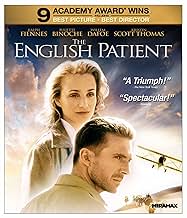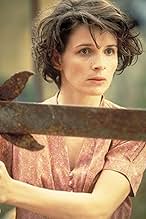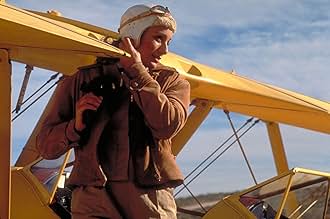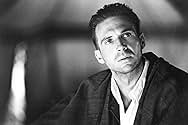Al final de la Segunda Guerra Mundial, una joven enfermera atiende a una víctima de accidente de avión gravemente herida. Conocemos su historia en flashbacks que revelan un fatídico romance.Al final de la Segunda Guerra Mundial, una joven enfermera atiende a una víctima de accidente de avión gravemente herida. Conocemos su historia en flashbacks que revelan un fatídico romance.Al final de la Segunda Guerra Mundial, una joven enfermera atiende a una víctima de accidente de avión gravemente herida. Conocemos su historia en flashbacks que revelan un fatídico romance.
- Dirección
- Guionistas
- Elenco
- Ganó 9 premios Óscar
- 62 premios ganados y 78 nominaciones en total
- Dirección
- Guionistas
- Todo el elenco y el equipo
- Producción, taquilla y más en IMDbPro
Opiniones destacadas
I'm sure many of those who hated it are much like a co-worker of mine who said "Books? I haven't a book since I had to in high school." I checked some of the names of the people who reviled this movie and sure enough it seems many of them think Armaggedon was an "awesome" movie and Chris Farley was a "Comic genius". And that's O.K. Taste is an individual thing.
My sensibilities tell me that the english patient is a very good movie that takes effort to appreciate. Much in this movie is very subtle. It is not a vacation for the brain.(Hey, sometimes the brain NEEDS a vacation, and stupid movies provide that!) Also, it is not a cynic's movie. It's about idealism, tragedy and regret. About how people can want the best but have it all fall apart because of bad choices, and have to go on with the regret of never being able to remedy the situation. Not so much a love story as a tragic one. So many people destroyed because of the selfishness of two people couldn't(wouldn't?) control themselves.
I would ask those who thought the movie boring to watch it again when you feel able to pay full attention to what's going on in the film and how different bits of dialogue dovetail into subtle suggestions of how the characters are feeling and thinking. This movie takes an investment of time, thought and emotion. If this investment is made, I think most people who watch it will feel rewarded.
It's WWII; flying above the African desert, Hungarian Count Laszlo de Almasy (Ralph Fiennes) is shot down, his biplane mistaken for an enemy aircraft. And though he survives the crash, he is severely burned. To his great good fortune, however, he is rescued by a tribe of nomads and winds up in a hospital. But existing conditions are governed by circumstances of war, and Almasy soon becomes one of many patients being transported via convoy to a different facility. Upon reaching Italy, he is too weak and ill to continue on, and a Canadian nurse, Hana (Juliette Binoche), volunteers to stay behind with him at an abandoned monastery.
Hana soon discovers that her charge is something of a man of mystery, as Almasy remembers nothing of his past, and not even his own name. Thought to be English, the only clues pointing to who he is are contained in a book found in his possession after the crash, but even they are as cryptic as Hana's patient. Slowly, however, under prompting from Hana, Almasy begins to remember bits and pieces of his life, and his story begins to unfold. And his memory is helped along even more by the appearance of a mysterious stranger named Caravaggio (Willem Dafoe), who suspects that Almasy is the man he's been looking for-- a man with whom he wants to settle a score. But, burned beyond recognition, Almasy may or may not be that man. Meanwhile, Almasy's memories continue to surface; memories of a woman he loved, Katherine Clifton (Kristin Scott Thomas)-- as well as memories of Katherine's husband, Geoffrey (Colin Firth). And, crippled in mind and body as he is, those memories become the only thing left to which he can cling with any hope at all, even as his life seems to be slipping farther away with each passing moment.
In addition to directing, Anthony Minghella also wrote the screenplay for this film, which he adapted from the novel by Michael Ondaatje. The result is an epic saga presented in the tradition of Lean's `Doctor Zhivago' and `Lawrence of Arabia'; a magnificent film that fills the screen and the senses with unprecedented grandeur and beauty. Simply put, Minghella's film is genius realized; crafted and delivered with a poetic perfection, watching it is like watching a Monet come to life. From the opening frames, Minghella casts a hypnotic spell over his audience that is binding and transporting, with a story that has an emotional beauty that equals the engagingly stunning and vibrant images brought to life by John Seale's remarkable cinematography; images that virtually fill the screen as well as the soul of the viewer. In every sense, this is a film of rare eloquence, with a striking emotional capacity that facilitates an experience that is truly transcendental. Nominated in twelve categories, it deservedly received a total of nine Oscars, including Best Picture, Director, Supporting Actress (Binoche) and Cinematography.
If one had to choose a single word to describe the `essence' of this film, it would be `excellence.' Even an extraordinary film, however, does not receive nine Oscars without performances that are extraordinary in kind; and the performances given by Ralph Fiennes and Kristin Scott Thomas here transcend the term `Oscar worthy.' Nominated for Best Actor for his portrayal of Almasy (Geoffrey Rush was awarded the gold for `Shine'), Fiennes has never been better, achieving an emotional depth with his character that is nearly palpable. Private and introspective, Almasy is not by his very nature an individual to whom the audience will be able to form an intimate connection; Fiennes, however, finds a way to open that emotional door just enough to let you in, enough so that you taste the honest passion welling up within him. And it works. Almasy does not seek your friendship; he will, however, gain your compassion.
Kristen Scott Thomas, too, received an Oscar nomination for Best Actress (Frances McDormand received the award for `Fargo') for her portrayal of Katherine, a woman whose stoic countenance masks the emotional conflict raging within her, born of the forbidden passion that enslaves her and yet to which she gives herself willingly, casting off her shackles of repression to embrace a love so strong it threatens to consume her. The reserve Katherine must maintain evokes the empathy of the audience, as Scott Thomas successfully mines the emotional depths of her character to the greatest possible effect. It's the kind of performance that draws you in and holds you fast, taking you as it does beyond that curtain of hypocrisy that dictates what must be if only for the sake of appearances, and allows you to experience a true sense of unbridled passion. Understated and shaded with subtlety, it's terrific work by Kristin Scott Thomas.
Binoche gives a stunning, affecting performance, as well, as the kindhearted nurse, Hana; it is her humanity, in fact, which defines love in it's purest sense and offers a balanced perspective of it within the context of the film. Her relationship with Kip (Naveen Andrews) affords us a glimpse of passion of another kind, which contrasts effectively with the intensity of that between Almasy and Katherine. `The English Patient' is a film that will move you and fill you emotionally; one you will not want to see end. 10/10.
This is quite a modern epic. It has the running time of an epic, it has the gorgeous cinematography of an epic, it has the acting of an epic and it has a story of love (lust) against the backdrop of major events in history. Even though it changes or leaves out a significant amount of the original novel it still manages to be a great mix of passionate desire and mystery. The mystery of the story is represented by the thief Caravaggio who casts light on what he knows of de Almásy's past (as he sees it) while the love story is unfolded as it develops in a passionate affair between him and Katherine, a colleagues' wife. The story is compelling enough to carry the long running time, at times the pace seems a little slow and when I saw it in my local multiplex there were some moments where large portions of the audience seemed to be shifting in their seats.
The love' of the story was interesting as it seems to be contrasted with Hana's relationship with Kip the bomb disposal expert. While de Almásy's relationship with Katherine starts as lust and desire before growing into what seems to be love (or could be grief at the result of their affair), Hana's is portrayed as purer and more careful as she fears those she loves will die. This difference helped me see that the film did want to show the destructive power of lust and affairs, however the fact that the central relationship was based more on lust than love took away from the emotional core of the story.
The acting is almost impeccable. Fiennes is excellent even when he is lost behind an unrecognisable mask of burnt flesh. Thomas is actually very good, I find she tends to be very wooden in some things but this type of very English character brings the best out of her. Binoche is excellent as Hana and carries the heart of the film. Dafoe is truly excellent - his element of the story is the mystery and he does it well. He is a great actor and deserves to be in things this good. The support cast include plenty of good actors including Colin Firth, Jurgen Prochnow and Naveem Andrews.
The film is beautifully shot - even though it's all a bit too picturesque to be real! However the director can handle himself well with many different scenes - a tense bomb diffusal, a passionate love scene, a dangerous sand storm etc. Overall the slow pace may frustrate some younger audiences but this is a really good film that draws it's values from classy sources.
Oscars Best Picture Winners, Ranked
Oscars Best Picture Winners, Ranked
¿Sabías que…?
- TriviaThe Germans who shoot at Almásy's plane at the beginning were actually tourists roped into the production because they couldn't afford any more extras.
- ErroresKatharine Clifton (Scott-Thomas) explains to Count László Almásy (Fiennes), that her husband is map making in Ethiopia. The year at this point is 1939, and the country was known as Abyssinia until 1945.
- Citas
Katharine Clifton: My darling. I'm waiting for you. How long is the day in the dark? Or a week? The fire is gone, and I'm horribly cold. I really should drag myself outside but then there'd be the sun. I'm afraid I waste the light on the paintings, not writing these words. We die. We die rich with lovers and tribes, tastes we have swallowed, bodies we've entered and swum up like rivers. Fears we've hidden in - like this wretched cave. I want all this marked on my body. We are the real countries. Not boundaries drawn on maps with the names of powerful men. I know you'll come carry me out to the Palace of Winds. That's what I've wanted: to walk in such a place with you. With friends, on an earth without maps. The lamp has gone out and I'm writing in the darkness.
- Créditos curiososDisclaimer in end credits: "While a number of the characters who appear in this film are based on historical figures, and while many of the areas described - such as the Cave of Swimmers and its surrounding desert - exist and were explored in the 1930s, it is important to stress that this story is a fiction and that the portraits of the characters who appear in it are fictional, as are some of the events and journeys."
- Bandas sonorasYes! We Have No Bananas
Words and Music by Frank Silver and Irving Cohn (as Irving Conn)
Published by Skidmore Music Co., Inc.
Selecciones populares
Detalles
- Fecha de lanzamiento
- Países de origen
- Sitios oficiales
- Idiomas
- También se conoce como
- The English Patient
- Locaciones de filmación
- Productoras
- Ver más créditos de la compañía en IMDbPro
Taquilla
- Presupuesto
- USD 27,000,000 (estimado)
- Total en EE. UU. y Canadá
- USD 78,676,425
- Fin de semana de estreno en EE. UU. y Canadá
- USD 278,439
- 17 nov 1996
- Total a nivel mundial
- USD 231,976,425
- Tiempo de ejecución
- 2h 42min(162 min)
- Color
- Mezcla de sonido
- Relación de aspecto
- 1.85 : 1








































